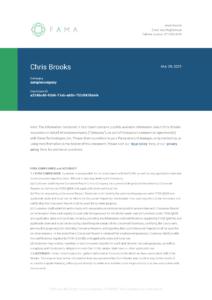How Social Media Screening Protects Employers & Staff
We have something exciting to share: One Source has a new-and-improved, FCRA-compliant Social Media Hiring Report to offer! It examines common social media sites like Twitter/X, Facebook, and Instagram, as well as over 10,000 other online sources of information for nine different types of workplace misconduct like violence, fraud, harassment, hate speech, and more.
“That’s great,” you might think, “But why should my team incorporate it in our employment screening package?” Well, we’re here to fill you in by covering what information can be revealed and the impact employee social posts can have on a company.
Areas of Concern
These days, nearly everybody (and their dog) has a social media presence. The myriad of platforms available may have different logins, feeds, and content options that can make it difficult to get the full picture of someone’s character; but when viewed together, they can form a cohesive look at a person’s attitudes, beliefs, and online presence.
If hostile language, harassment, or bullying are found on an individual’s account or within their activity, it can be a substantial cause for concern. Should an incident happen due to a lack of oversight in vetting new hires properly, your organization may be liable for a negligent hiring lawsuit. This form of litigation can be costly, too. Reports indicate that the average settlement cashes in at almost $1.5 million, and that’s only in monetary costs. In cases such as these, and even those that don’t make it to court, it doesn’t take long for word to spread and the public to take notice. Let’s look at two examples.
The Court of Public Opinion
In January of this year (2023), TechRaptor reported that a Twitter/X user pointed out that several posts made by the community manager of Limited Run Games, a company that publishes physical copies of popular digital video games, contained targeted and hateful language. Quick to respond—on the same day the tweets were posted, no less—the company investigated the situation and proceeded to terminate the employee in question.
Another instance in May, as reported by New Delhi Television (NDTV), reveals that a now-former-employee of global professional services organization Deloitte called Adolf Hitler “charismatic,” “intellectual,” and a “massive action taker” in a LinkedIn post. Shortly after, backlash grew online until Deloitte terminated their employee as well.
These cases may seem benign, but they represent much more. Each employee had to be trained and compensated, wasting valuable time and money that could have been better spent elsewhere. In addition, the amount of revenue lost to potential customers choosing another company or service provider may not be known for years to come.
At this point, the question becomes, “How can my organization stay ahead of these issues?”
A Solution You Can Trust
The first thing to do is to have a clear policy in place regarding the use of social media. The Society for Human Resource Management (SHRM) recommends that it outline what kinds of content can be flagged, the scope of the searches being conducted, and the consequences incurred if problematic content is found.
Following that, you’ll want to include social media screenings as part of your company’s background checks for employment purposes within the hiring process. If hits are found through searches or specific buzzwords, you can receive actionable data to base hiring decisions on in one convenient document. Below is an example of one such report One Source offers:
For more information on the benefits of social media screening, read 3 Reasons Why Companies Should Utilize Social Media Checks or get in touch with us today.












